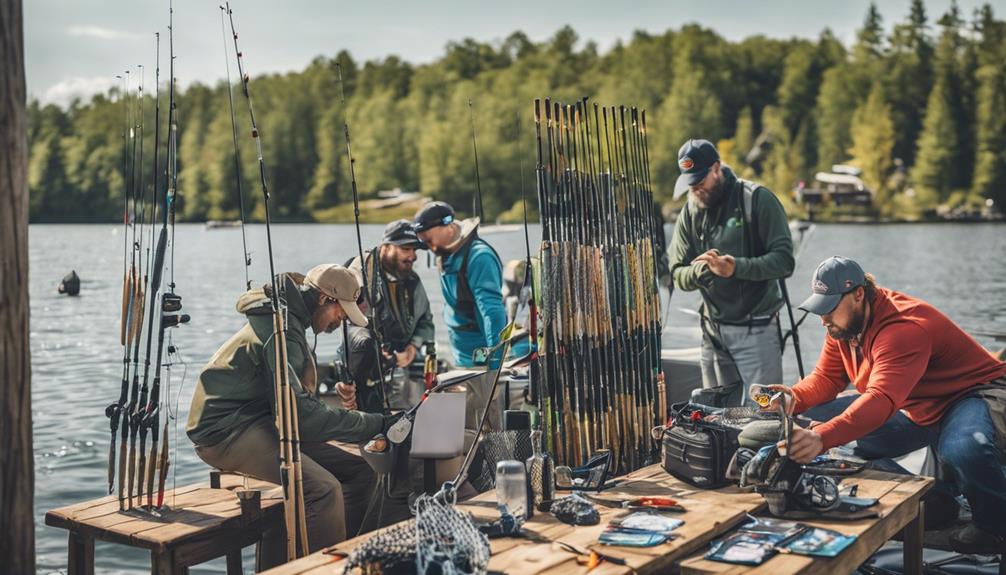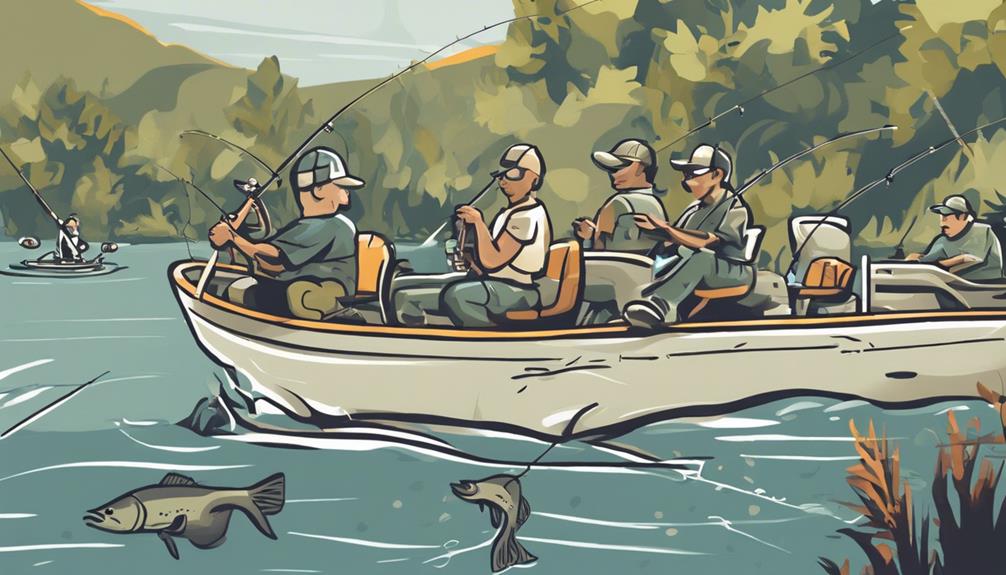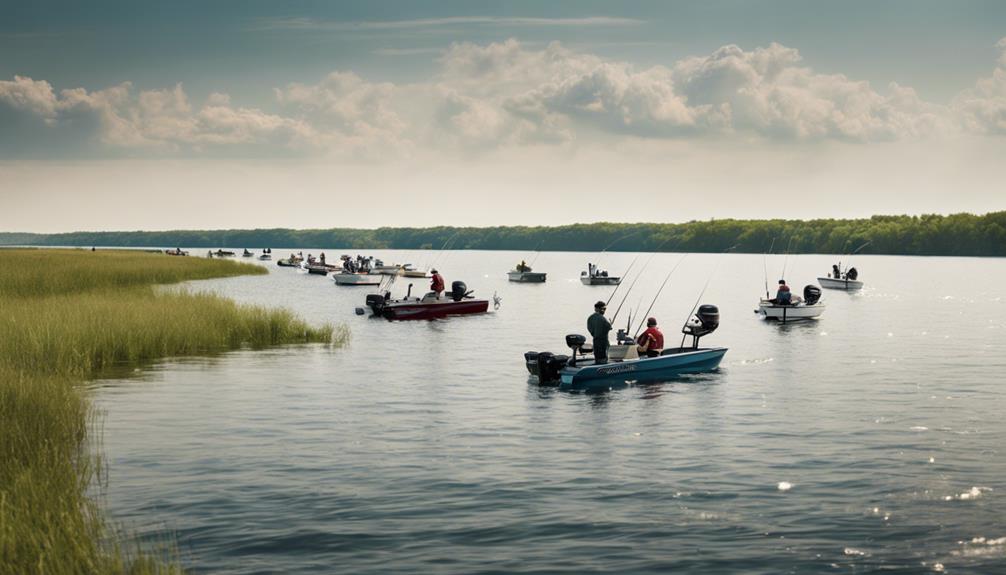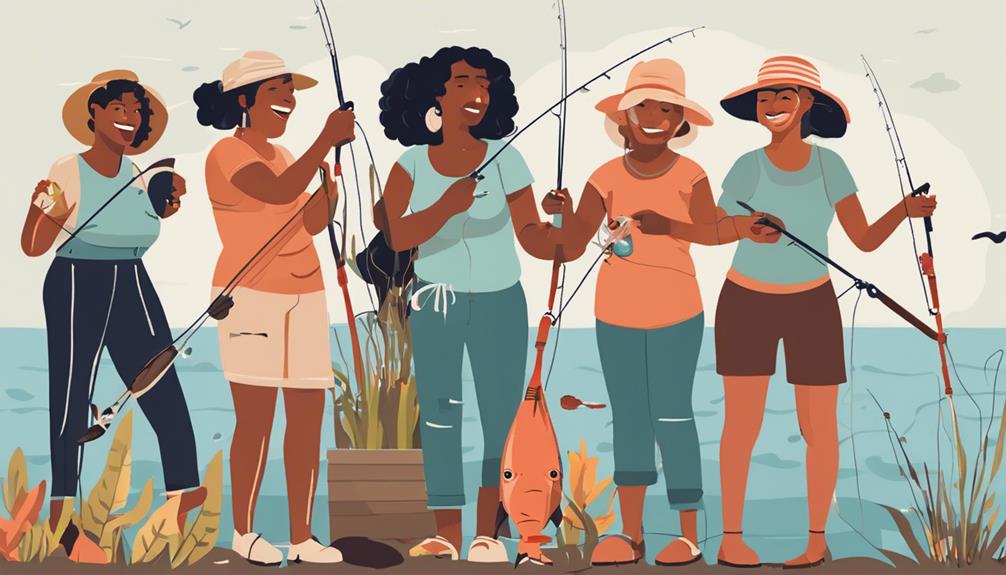Explore various fishing events to find the right fit. Consider skill level, prizes, rules, and location. Familiarize yourself with tournament regulations and gear up with essentials like extra line and first aid. Maintain your equipment diligently for top performance. Dedicate time to practice and develop strategies for success. Invest in a quality measuring device for accurate scoring. Embrace sportsmanship and build camaraderie. Reflect on your experience to improve for future competitions. Prepare for an unforgettable journey into the world of fishing tournaments. There's a wealth of information waiting to guide you towards tournament success.
Finding the Right Tournament
When looking for a fishing tournament to participate in, research various events to find the one that aligns best with your skill level and preferences. Start by researching options online, checking out fishing websites, social media groups, and local fishing forums. These platforms often list upcoming tournaments, providing details such as location, entry fees, prizes, and rules. Consider the type of fish you enjoy catching and the kind of fishing experience you seek. Some tournaments focus on specific species like bass or trout, while others may be more general.
Location scouting is crucial when choosing a tournament. Think about how far you're willing to travel and if the tournament location is suitable for the type of fishing you prefer. Check if the tournament will be held in freshwater or saltwater, a lake, river, or ocean. Take into account factors like weather conditions, accessibility, and the overall fishing environment. Additionally, consider the amenities available at the location, such as parking, restrooms, and nearby accommodations.
Understanding Tournament Rules
Understanding the rules of a fishing tournament is essential for ensuring fair play and a smooth competition experience. Rule interpretation plays a crucial role in your performance during the tournament. Familiarize yourself with the specific regulations of the event you're participating in. Rules can vary between tournaments, so it's important to know the dos and don'ts to avoid penalties or disqualification.
Compliance checks are commonly conducted before, during, and after the tournament. Before the competition begins, organizers may inspect your gear to ensure it complies with the rules. During the tournament, compliance checks can occur on the water to verify that participants are following the guidelines. After the event, winners may undergo a thorough examination to confirm their adherence to the rules.
To navigate the tournament successfully, pay attention to details such as catch sizes, allowable fishing methods, and restricted areas. Interpret the rules accurately to avoid any misunderstandings that could impact your standing in the competition. Remember that each rule is in place to maintain fairness among all participants.
Essential Gear for Competing
To compete effectively in fishing tournaments, ensuring you have the essential gear is crucial for your success. One of the key aspects of gear maintenance is keeping your rods and reels in top condition. Before the tournament, make sure to clean and lubricate your equipment to ensure smooth operation. Additionally, having the right tournament attire is important. Dress in comfortable clothing that allows for ease of movement, and don't forget a hat, sunglasses, and sunscreen to protect yourself from the elements.
When it comes to packing essentials, organization is key. Make a checklist including items like extra line, hooks, sinkers, pliers, and a first aid kit. It's also wise to pack snacks, water, and a cooler with ice to keep your catch fresh. In terms of backup equipment, always have spare rods and reels in case of malfunctions. A backup tackle box with essential lures and baits can also save the day if you lose or damage your primary one.
Preparing Your Fishing Equipment
Properly maintaining and preparing your fishing equipment is essential for optimal performance during tournaments. To ensure your gear is tournament-ready, follow these crucial steps:
- Cleaning: After each fishing trip, make sure to clean your equipment thoroughly. Rinse your reels with fresh water to remove any salt or debris that could cause damage. Wipe down rods and reels with a damp cloth to prevent corrosion.
- Maintenance: Regularly inspect your equipment for any signs of wear and tear. Check for loose guides on your fishing rod, smooth operation of the reel's drag system, and ensure that all connections are secure. Replace any worn-out parts to prevent malfunctions during crucial moments in the tournament.
- Equipment inspection: Before the tournament, give your gear a comprehensive inspection. Make sure all rods are properly aligned, reels are functioning smoothly, and lines are free from tangles or frays. Test your drag settings to ensure they're adjusted correctly for the fish you'll be targeting.
- Tackle organization: Keep your tackle organized and easily accessible. Sort your lures, hooks, and other tackle items in a tackle box so you can quickly switch out gear as needed during the tournament. A well-organized tackle box can save you valuable time on the water.
Strategies for Tournament Success
For tournament success, strategic planning is key to outperforming your competition and increasing your chances of victory. Start by dedicating time to pre-tournament practice. Familiarize yourself with the competition area, study the water conditions, and practice different fishing techniques that could be beneficial during the tournament. Mental preparation is equally important. Visualize success, stay focused, and maintain a positive attitude throughout the competition.
In team tournaments, effective team dynamics and communication strategies are crucial. Develop a game plan with your team members, assign roles based on strengths, and establish clear communication channels. During the tournament, coordinate with your team, share information about successful fishing spots or techniques, and adapt your strategy based on real-time feedback.
Remember that every decision counts in a fishing tournament. Stay organized by creating a checklist of essential items, such as fishing gear, snacks, water, and any required paperwork. Plan your fishing route wisely, considering factors like weather conditions and the movement of fish. Be adaptable and ready to switch tactics if your initial approach isn't yielding results.
Mastering Catch Measurement
Master the art of accurately measuring your catches to ensure compliance with tournament regulations and to maximize your scoring potential. To improve your catch measurement skills, consider the following practice techniques and accuracy tips:
- Use a Quality Measuring Device: Invest in a reliable measuring tape or board specifically designed for fishing tournaments. Ensure it's durable, waterproof, and clearly marked for precise measurements.
- Practice Consistency: Develop a consistent method for measuring your catches. Whether you measure from the snout to the tail tip or the total length, stick to one technique to avoid discrepancies.
- Mind the Angles: When laying your catch on the measuring device, make sure it's straight and positioned correctly. Even a slight angle can result in inaccurate measurements, potentially affecting your score.
- Check Twice, Measure Once: Before submitting your measurements, double-check the accuracy. Ensure that the fish is fully stretched out, and the measurement is taken from the appropriate point to guarantee precision.
Etiquette and Sportsmanship Tips
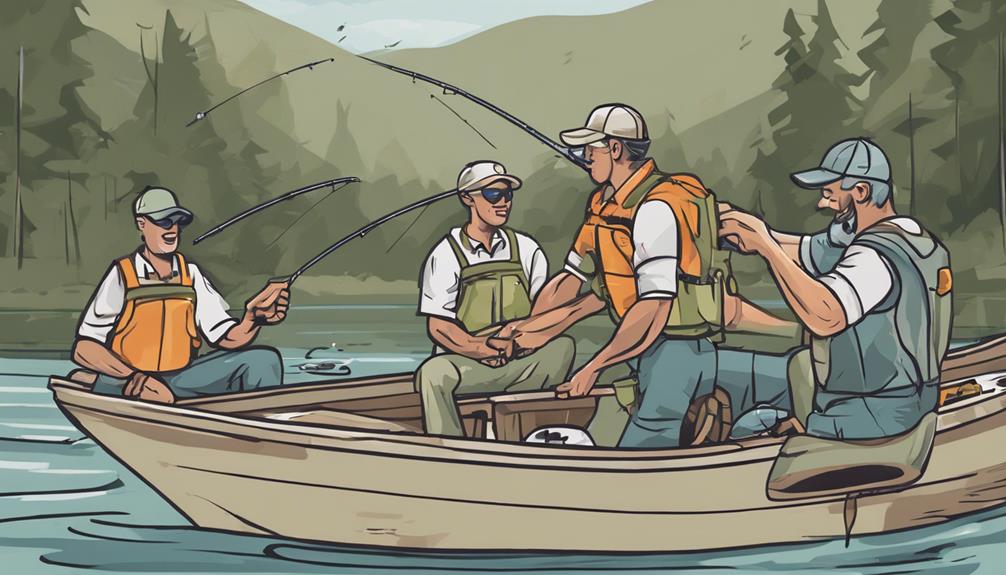
To maintain a positive atmosphere during fishing tournaments, remember to demonstrate respectful behavior and uphold the values of sportsmanship throughout your interactions with fellow anglers. Proper attire is essential when participating in fishing tournaments. Wearing appropriate clothing, such as moisture-wicking attire and non-slip footwear, not only enhances your performance but also shows respect for the sport and fellow competitors.
Rule enforcement is crucial in fishing tournaments to ensure fairness and integrity. Familiarize yourself with the tournament rules and regulations before the competition begins. Adhering to these rules not only demonstrates good sportsmanship but also helps maintain a level playing field for all participants. Respect the boundaries set by organizers and fellow anglers, and always follow catch-and-release guidelines to preserve the environment and fish populations.
During the tournament, maintain a positive attitude and avoid unsportsmanlike conduct. Cheer on fellow anglers, congratulate them on their catches, and offer assistance when needed. Remember, fishing tournaments aren't just about winning but also about building camaraderie and respect within the angling community. By embodying these etiquette and sportsmanship tips, you contribute to a welcoming and enjoyable environment for everyone involved.
Post-Tournament Reflections
Reflecting on your performance and experiences after a fishing tournament is crucial for growth and improvement in your angling skills. Once the competition has ended, take some time to ponder over the following key aspects:
- Improvement Opportunities: Reflect on areas where you could enhance your techniques or strategies. Consider things like bait selection, casting accuracy, or boat positioning that could have been done differently to yield better results.
- Competition Camaraderie: Recall the interactions you had with other participants. Did you learn any new tips or tricks from fellow anglers? Building relationships within the fishing community can be enriching and beneficial for future tournaments.
- Mental Preparation: Evaluate how well you managed your stress and emotions during the tournament. Were there moments of frustration or nervousness that affected your performance? Identifying these mental hurdles can help you work on staying focused and composed in future competitions.
- Lessons Learned: Take note of the overall lessons you learned from the tournament experience. Whether it's about patience, adaptability to changing conditions, or the importance of proper gear maintenance, each competition can offer valuable insights to carry forward.
Frequently Asked Questions
Can I Use Live Bait in Fishing Tournaments?
Yes, you can use live bait in fishing tournaments, but it's important to note that many tournaments prefer artificial lures for a fair competition.
When using live bait, make sure to follow any rules or regulations set by the tournament organizers. Some tournaments may require catch and release practices to preserve fish populations.
Always check the specific guidelines of the tournament you're participating in to ensure you're in compliance.
Are Electronic Fish Finders Allowed in Tournaments?
Yes, electronic fish finders are generally allowed in fishing tournaments, but some competitions may have technology restrictions in place. This is to ensure fair play and maintain the traditional aspects of the sport.
Before participating, it's crucial to familiarize yourself with the specific rules of the tournament you're entering regarding the use of electronic devices.
Adhering to these guidelines will help maintain a level playing field for all participants.
What Happens if My Catch Exceeds the Size Limit?
If your catch exceeds the size limit in a fishing tournament, penalty consequences may apply. Organizers often use specific size measurement techniques to determine if a fish meets the regulations.
It's crucial to familiarize yourself with the rules and guidelines of the tournament to avoid such penalties. Be aware of the size limits for different species of fish and ensure you adhere to them to stay in compliance with the tournament rules.
Is Chumming Allowed During Tournament Fishing?
Yes, chumming is generally allowed during tournament fishing, but it's essential to adhere to chumming regulations set by the specific tournament guidelines.
Proper tournament etiquette should always be maintained when chumming to avoid any conflicts with other participants.
Make sure to familiarize yourself with the rules and guidelines regarding chumming to ensure a fair and respectful competition for all anglers involved.
How Are Tiebreakers Typically Determined in Tournaments?
In fishing tournaments, tiebreakers are typically determined by scoreboard rankings and fish weigh-ins. When two or more participants have the same weight of fish caught, the order on the scoreboard is crucial.
The angler with the highest-ranked position on the scoreboard usually wins the tiebreaker. If the rankings are also the same, then the total weight of additional fish caught during the tournament can be used to break the tie.
Conclusion
Now that you have learned the basics of participating in fishing tournaments, you're ready to dive into the exciting world of competitive angling.
Remember to carefully select the right tournament for you, familiarize yourself with the rules, and ensure you have the necessary gear and skills to compete.
With practice and dedication, you can improve your chances of success in tournaments and enjoy the thrill of the competition.
Good luck out on the water!
